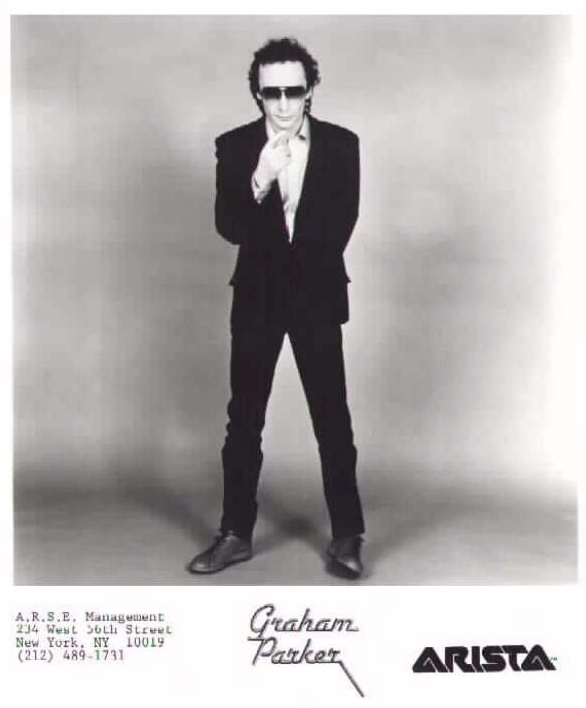

BIOGRAPHY
ARISTA RECORDS, INC.
ARISTA BUILDING
6 WEST 57 STREET NEW YORK, N.Y. 10019
Graham Parker's authority as a singer and writer, his ability to communicate anger, humor, and urgency, has made him one of rock music's pivotal figures. Over the past six years he's made a series of albums, including Squeezing Out Sparks (named, by critical consensus, the best of 1979 in the Village Voice poll), Heat Treatment and Howlin' Wind, that stand among the finest of the last decade. His new LP, Another Grey Area, produced by Jack Douglas, is a significant move for Parker. It's his first album in nearly two years, and his first without the band that had been with him since his beginnings in the mid-1970s.
Another Grey Area's producer (winner of this year's Grammy for Album Of The Year for co-producing Double Fantasy, and veteran of LPs by Aerosmith, Patti Smith, Cheap Trick, and others) says that the album "has a kind of late '60s R&B feel to it. We used a lot of live vocals with the band playing off him, and so the album's mood is really set around his rhythm." Already, the album's lead track, "Temporary Beauty," is making strong inroads on radio, and the rest of the album is packed with Parker's unfettered fusings of rock, R&B, and reggae on cuts like "You Hit The Spot," "It's All Worth Nothing Alone," "No More Excuses," and "Crying For Attention."
"Parker's advent," Greil Marcus wrote, "was a sign that the decade was finally toughening up." When he emerged, straight from a job pumping gas, rock was deep in the throes of its mid-decade, pre-punk doldrums. Said Parker: "At the time, we were extraordinarily new. There were other things going on that were part of a new kind of energy, but when we first started, I felt that I was the only person doing this, but that there's gonna be some more soon.
For his debut album, Howlin' Wind, Parker was matched with a bunch of musicians who coalesed from the tattered remnants of such U.K. "pub bands" as Brinsley Schwarz, Ducks Deluxe, and Boutemps Roulez. With Nick Lowe producing, Parker came out swinging with a record that was instantly hailed as rock and roll of classic stature. He and his band The Rumour became one of the tightest live-and-on-record bands on either side of the Atlantic; the evidence was on a promo-only live LP recorded at Marble Arch, on their second studio album, Heat Treatment, on a pink-vinyl EP that included a hot version of The Trammps' "Hold Back The Night."
By the end of 1976, Graham Parker and The Rumour had won notice as the year's best new band from Rolling Stone, and their two albums placed #2 and #4 in the Voice critics poll. As The Los Angeles Times said, Parker could "make even the most disheartened cynic believe rock can matter again." Parker and Co. went on to cut the American-influenced album Stick To Me and a double live set, The Parkerilla, before changing record label affiliations in 1979.
Leaving his former label with a pointed farewell ("Mercury Poisoning"), Parker went into the studio with producer Jack Nitzsche, and the result was Squeezing Out Sparks, an album of pantheon caliber ("highly charged, yet ruthlessly economic," wrote the Boston Phoenix. "Fierce and fearless"). It was followed in bracing fashion by The Up Escalator, and then followed by a short period of retreat.
"I don't want to be a rock and roll animal," he told The Face. "Because it should be secondary to your life. It's your life that makes the songs in the first place. That's what it's about. In the end you don't have much going for yourself apart from what you have between people."
The songs on Another Grey Area are marked by this realization, and by the frustration of being "at a shaky point in history. You start to realize how transient it all is."
On his new album, he sounds as vivid
and brittle as ever, backed by a band that includes guitarists
Hugh McCracken, David Brown, bassist Doug Stegmeyer, drummer Michael
Braun, and keyboard players Nicky Hopkins, George Small, and Ed
Walsh (synthesizer). His music continues to make most other rock
and roll look like pale shades of grey by comparison.
Back to GP album discography | GP promos and more